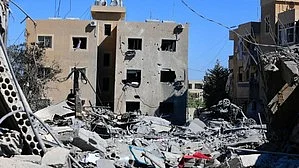Israeli strikes kill 700 in Lebanon; no sign of ceasefire
Lebanese environment minister Nasser Yassin noted earlier that the bombardment had already displaced more than 150,000 residents in just 72 hours

The reported casualties in Lebanon from Israeli airstrikes are deeply concerning. According to an Al Jazeera report, Israel has dismissed global calls for a ceasefire and continued its air strikes (purportedly targetting Hezbollah operations) that have killed more than 700 people in Lebanon since Monday, 23 September.
Per its health ministry, Israel conducted attacks across Lebanon on Thursday, 26 September. The large-scale airstrikes, which started on Monday and were initially focused on the south and east of Lebanon, have now spread to include regions in the Mount Lebanon governorate on its fourth day, the Xinhua news agency reported.
Footage from Lebanese TV channel Al Jadeed showed rescue teams and ambulances rushing to the densely populated area to transport casualties to the hospital and remove victims from beneath the rubble.
Meanwhile, the Israel Defense Forces (IDF) reported that it launched three missiles in ‘an intelligence-guided attack’ on Mohammed Hussein Sarour, commander of Hezbollah's air unit, claiming he was killed in the strike. The military stated that Sarour was responsible for multiple drone and missile attacks against Israel.
So far, Hezbollah has not commented on the attack nor confirmed Sarour's death.
Additionally, the IDF announced that its 7th Armored Brigade concluded a military drill a few kilometres from the Lebanese border, simulating a ground operation in Lebanon.
This drill followed a proposal by France at a United Nations Security Council emergency meeting for a 21-day ceasefire in Lebanon, in collaboration with the United States "to allow for negotiations".
Lebanese prime minister Najib Mikati welcomed the proposal; however, Israel denied earlier on Thursday that it had agreed to a ceasefire with Hezbollah or Lebanese political parties.
The Israeli military reported that it has targeted over 2,000 locations since 23 September.
Lebanese environment minister Nasser Yassin noted on Wednesday, 25 September, that the bombardment had displaced more than 150,000 residents in the last 72 hours.
This sharp escalation has raised concerns about a potential full-scale conflict between Israel and Lebanon, with fears that other regional powers could also become involved.
Israel's onslaught on Lebanon was preceded by a kind warning from Israeli prime minister Benjamin Netanyahu for civilians to evacuate to safe zones — reminiscent of last year's Halloween message to the Palestinians of the Gaza strip a few weeks into Israel's retaliation against the 7 October Hamas attack.
With IANS inputs
Follow us on: Facebook, Twitter, Google News, Instagram
Join our official telegram channel (@nationalherald) and stay updated with the latest headlines